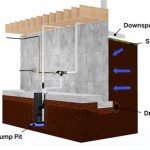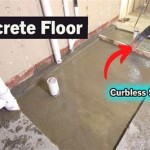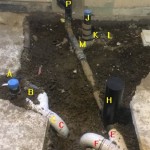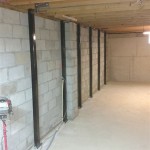What is the Best Sealer for Concrete Basement Walls?
Concrete basement walls are inherently porous, making them susceptible to moisture penetration. This moisture can lead to a host of problems, including mold growth, musty odors, efflorescence (salt deposits), and structural damage over time. Selecting the right sealer for concrete basement walls is crucial for mitigating these risks and preserving the integrity of the foundation. The term "best" is subjective and depends heavily on specific basement conditions, intended use of the space, and budget. This article explores the key considerations in choosing a concrete sealer, examining various types of sealers and their suitability for basement applications.
Basement walls are constantly exposed to hydrostatic pressure, which is the force exerted by water in the surrounding soil pushing against the foundation. This pressure can drive moisture through the concrete pores, leading to dampness and water accumulation inside the basement. The effectiveness of a sealer depends on its ability to withstand this pressure and create a barrier against water intrusion.
Before applying any sealer, proper preparation of the concrete surface is paramount. This typically involves cleaning the walls thoroughly to remove dirt, dust, loose particles, and any existing coatings. Depending on the condition of the walls, patching cracks and repairing any structural damage may also be necessary. A clean, sound surface ensures proper adhesion of the sealer and maximizes its long-term performance.
Furthermore, understanding the ventilation and humidity levels within the basement is essential for selecting the appropriate sealer. Basements with poor ventilation and high humidity are more prone to moisture-related problems, requiring a sealer that offers excellent moisture resistance and vapor permeability. Conversely, basements with good ventilation may benefit from a different type of sealer with alternative properties.
Understanding Types of Concrete Sealers
Concrete sealers fall into two main categories: penetrating sealers and coating sealers. Each type works differently and offers distinct advantages and disadvantages for basement wall applications.
Penetrating sealers, as the name suggests, penetrate into the concrete pores, chemically reacting with the concrete to form a waterproof barrier within the concrete itself. These sealers do not form a surface film and typically do not alter the appearance of the concrete significantly. Silanes, siloxanes, and silicates are common types of penetrating sealers used for concrete basement walls.
Silane sealers are known for their small molecular size, allowing them to penetrate deeply into the concrete. They are effective at preventing water absorption and protecting against chloride-induced corrosion, making them suitable for basements exposed to de-icing salts or other contaminants. However, silanes may not be as effective at blocking vapor transmission as some other types of sealers.
Siloxane sealers are similar to silanes but have a larger molecular size, which may limit their penetration depth. However, they offer good water repellency and are often more cost-effective than silanes. Siloxane sealers are a reliable choice for many basement applications where deep penetration is not a primary concern.
Silicate sealers react with the calcium hydroxide in concrete to form calcium silicate hydrate, a dense, durable material that helps to fill the pores and increase the concrete's resistance to water penetration. Silicate sealers are often used to harden and dustproof concrete surfaces, making them a good option for basements where dust control is important. They are also known for their alkali resistance.
Coating sealers, on the other hand, form a protective film on the surface of the concrete. These sealers provide a barrier against water and other substances, but they can also alter the appearance of the concrete. Acrylics, epoxies, and urethanes are common types of coating sealers used for concrete surfaces.
Acrylic sealers are typically less expensive and easier to apply than other types of coating sealers. They offer good UV resistance and are available in a variety of colors and finishes. However, acrylic sealers are generally less durable and less resistant to abrasion and chemicals than epoxies or urethanes. They may also be more susceptible to blistering and peeling in damp environments, therefore they are often not the best choice for basement walls.
Epoxy sealers provide a hard, durable, and chemical-resistant coating. They are well-suited for basements that are used as workshops or garages where resistance to spills and impacts is important. Epoxy sealers are generally moisture impermeable, preventing both water absorption and vapor transmission. However, this can be a disadvantage in some basements, as it can trap moisture within the concrete and lead to problems such as blistering or delamination. Proper surface preparation and a suitable primer are essential for successful epoxy application.
Urethane sealers offer excellent abrasion resistance, chemical resistance, and flexibility. They are often used as topcoats over epoxy sealers to provide enhanced protection and durability. Urethane sealers are available in a variety of finishes, including matte, satin, and gloss. They are also relatively resistant to UV degradation, although some yellowing may occur over time. Urethane sealers can be a good choice for basements that require a durable and aesthetically pleasing finish.
Key Considerations When Choosing a Sealer
Selecting the right sealer for concrete basement walls requires careful consideration of several factors. Evaluating these factors will help determine the best choice for a specific situation.
Moisture Vapor Transmission (MVT): MVT refers to the rate at which moisture vapor passes through a material. In basements, MVT is a critical consideration, as moisture vapor can migrate through the concrete walls from the surrounding soil. Sealers with high MVT, like penetrating sealers, allow the concrete to "breathe," preventing moisture from becoming trapped within the walls. Sealers with low MVT, like some coating sealers, can prevent vapor transmission, but they may also trap moisture, leading to problems. Perform a moisture test on the concrete to determine the existing MVT rate and select a sealer that is appropriate for the measured level.
Water Resistance: The primary purpose of a concrete sealer is to prevent water penetration. The effectiveness of a sealer in resisting water depends on its chemical composition, application method, and the condition of the concrete surface. Look for sealers that are specifically designed for below-grade applications and that have been tested for water resistance. Consider the hydrostatic pressure that the walls will be exposed to and choose a sealer that can withstand that pressure. Consider using a waterproof membrane in addition to, or instead of a sealer, if water intrusion is a significant concern.
Durability and Longevity: Concrete sealers are not permanent solutions and will eventually require reapplication. The durability and longevity of a sealer depend on its chemical composition, the environment it is exposed to, and the level of traffic and abrasion it endures. Choose a sealer that is known for its durability and that is appropriate for the intended use of the basement. Consider factors such as resistance to chemicals, abrasion, and UV degradation. Read product reviews and consult with professionals to get an understanding of the expected lifespan of different sealers.
Application and Safety
Proper application is crucial for ensuring the effectiveness of any concrete sealer. Always follow the manufacturer's instructions carefully, paying attention to surface preparation, application method, and drying time. Different sealers may require different application techniques, such as brushing, rolling, or spraying. Wear appropriate personal protective equipment (PPE), such as gloves, safety glasses, and a respirator, to protect yourself from chemical exposure. Ensure that the basement is well-ventilated during and after application to allow the sealer to dry properly and to prevent the build-up of harmful vapors.
Surface preparation is essential for ensuring proper adhesion and performance of the sealer. Clean the concrete surface thoroughly to remove any dirt, dust, oil, or existing coatings. Patch any cracks or holes with a concrete patching compound. If the concrete is very smooth, it may be necessary to etch the surface with an acid solution to improve adhesion. Allow the concrete to dry completely before applying the sealer.
The application method will depend on the type of sealer and the size of the area to be sealed. For small areas, brushing or rolling may be sufficient. For larger areas, spraying may be more efficient. Apply the sealer in thin, even coats, following the manufacturer's recommendations for coverage rate. Allow the sealer to dry completely between coats.
Safety precautions are essential when working with concrete sealers. Always wear appropriate PPE, including gloves, safety glasses, and a respirator. Work in a well-ventilated area to avoid inhaling harmful vapors. Follow the manufacturer's instructions for storage and disposal of the sealer. Keep the sealer out of reach of children and pets.
Choosing the "best" sealer for concrete basement walls is a nuanced decision that depends on various factors. Understanding the different types of sealers, considering the specific needs of the basement, and following proper application procedures are all essential for achieving long-lasting protection against moisture intrusion and damage.

Waterproofing Basement Walls Dos And Don Ts To Remember Bob Vila

How To Waterproof Basement Walls With Flex Seal Products Youtube

Radonseal 5 Gal Plus Penetrating Concrete Sealer 110 The Home

Sealing Basement Walls And Floors Hgtv

Waterproofing Basement Walls Dos And Don Ts To Remember Bob Vila

Radonseal Plus 5 Gal Deep Penetrating Concrete Sealer For Foundations And Basement Floors 110 The Home

6 Best Paints For Concrete Basement Walls

Internal Concrete Sealer Timber Pro Coatings

How To Waterproof Your Basement True Value

Basement Floor Sealer The Best To Use For Floors
Related Posts







